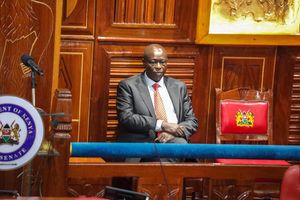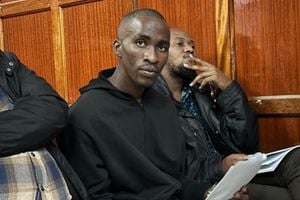Harmful practices: How Tujukumike initiative is empowering the vulnerable in Tharaka Nithi

Rescued survivors during the interview at Kamarandi Girls Rescue Centre in Chuka-Igamba Ng’ombe, Tharaka Nithi, on December 10, 2024.
What you need to know:
- Tujukumike is an initiative funded by Child Fund and implemented by Child Rise.
- Esther reveals that survivors are taught some life skills like personal hygiene, gardening and washing.
When we meet Lydia Mukami this chilly evening at Gaceraka Chief’s Camp in Chuka Igambang’ombe, Tharaka Nithi, all seems fine.
She sits pensively, listening to a gentleman called Geoffrey Gitonga address a gathering. Nothing betrays her past experience she had to endure as she battled for justice for her daughter, who was defiled by a neighbour. She occasionally nods in an apparent concurrence with what Geoffrey is telling the gathering.
Listening keenly, we learn that Geoffrey is creating awareness of child protection. He is in particular taking the gathering (men and women) through human rights of girls, who are the most vulnerable among the Tharaka.
“As parents, guardians and caregivers, it’s important that you know the human rights that your children, more so girls, enjoy. If your daughter, or that of your neighbour, is, for example, violated, you need to know the reporting pathways, including ensuring she does not take a bath, rushing her to hospital, ensuring P3 form is properly filled in and reporting the matter to the police to ensure she gets justice,” Geoffrey tells the gathering.
When we finally get a chance to chat with her, Lydia opens up on why she has been extra-attentive during the meeting. The meeting this evening, we learn, had been convened courtesy of Tujukumike initiative that is fighting harmful practices, among them female genital mutilation (FGM), child marriage and defilement.
Tujukumike is an initiative funded by Child Fund and implemented by Child Rise. Lydia tells Nation.Africa that it has been instrumental in creating awareness of FGM and child marriage. The mother of three is one of the community champions who have benefitted from the training, which came in handy when her daughter was defiled by a neighbour.
“After my 11-year-old daughter was defiled, I knew the reporting pathways needed. I took her to the hospital immediately and ensured the P3 form was filled in after she was examined by the doctors. The man was later arrested and charged in court with defilement. He was subsequently jailed for life for the offence he committed,” Lydia says in an interview.
She adds that the education she and other community members have received courtesy of the initiative has been an eye opener. “We have been holding meetings in school, churches and barazas to enlighten people on these harmful practices. The locals have been taught on reporting pathways in case they encounter children being violated.”
The initiative engages men as male champions to discourage retrogressive norms. A total of 105 teachers, 210 pupils, 105 members of school boards of management and 90 community members have been trained as champions who identify girls at risk of FGM and child marriage and those rescued.
The community champions have also been trained in referral pathways in instances where girls or boys are violated. The initiative also provides shelters to survivors. The champions conduct family sensitisation to their role in safeguarding girls and supporting them to achieve their potential.
According to the Kenya Demographic and Health Survey 2022, Tharaka Nithi has the highest FGM prevalence in Mt Kenya at 27 per cent. Child marriage is also rampant, with prolonged droughts having been blamed for driving families to “sell off” girls as a survival strategy.
Faith Wambua, a child protection specialist at Child Fund, says the project has been instrumental in the fight against harmful practices. “Champions identify child abuse cases, more so those that touch on girls. They have been trained in referral pathways in instances where girls or boys are violated,” Faith says.
They have also trained 36 child protection actors to work as their ambassadors across the county. “Our training has also focused on duty bearers, with the County Children Advisory Council benefitting from training in gender-based violence (GBV) prevention and school-based violence protection.”
Faith also reveals that they have refurbished five gender desks in police stations with a view to making them child-friendly. Coupled with persistent challenges such as child marriage, teenage pregnancies, and unsafe abortions, these issues have entrenched cycles of violence against women and girls.
Child Fund has been at the forefront of addressing these challenges through rescue operations in collaboration with the Department of Children Services, providing at-risk girls with safe spaces and support, building the capacity of the community, and working with child protection champions to challenge harmful traditions. They also engage male champions to promote gender equality.
Esther Gitonga, the centre manager at Kamarandi Girls Rescue Centre whose construction was funded courtesy of the project, says the centre has been instrumental in the rescue and hosting of girls at risk and survivors of FGM and child marriage.
“Whenever they come, the survivors normally grapple with mental health usually manifested in trauma and low-self-esteem, which makes them unable to open up. However, we take them through guidance and counselling, which makes them talk and share their harrowing tales.”
Esther reveals that survivors are also taught some life skills like personal hygiene, gardening and washing. Since the centre was started in 2022, it has rescued and hosted more than 25 FGM and child marriage survivors. Currently, the shelter has 10 survivors. Last month, they reintegrated 10 survivors into their families.
“After rescue we usually rehabilitate them and reintegrate them into their families in instances where there are no more threats detected. We look for family members who are willing and able to stay with them, in some instances, we fund their education through scholarships as many of them come from poor backgrounds,” Esther says.
Geoffrey says he started his activism against harmful practices after he learnt of a girl in the village who had been defiled by her own father. “As a man who is a father of girls, I could not understand how a man could defile his own daughter. Through the joint efforts of the community, the man was arrested, arraigned and jailed.”
From that time, he has never looked back and has been leading initiatives at the grassroots aimed at taming retrogressive cultural practices. The father of five (three girls and two boys) says he has been a male champion for the last 15 years. “In the course of my work, I have been trained by organisations, including Men End FGM and Child Fund. My passion for being an activist emanates from seeing girls discriminated against including being subjected to retrogressive practices like being denied education.”
To fully create awareness of the rights that girls enjoy, Geoffrey terms it important to do capacity building on human rights and reporting pathways. “There is a need for more awareness so that people in the community know what human rights entail and which rights their children enjoy.”
The male champions engage and recruit fellow men as allies to discourage retrogressive practices like FGM and child marriage.
James Njeru, the area senior assistant chief, is full of praise for the initiative, saying it has greatly helped in the protection of the girls. “We must ensure girls enjoy their rights and have access to education by going to school. It is also our duty to ensure girls are shielded from harmful cultural practices.”
Igambang’ombe Sub-County Children Officer Dennis Muthomi, another championing leading efforts to fight for the rights of girls, acknowledges that FGM is still being practised under utmost secrecy. “FGM prevalence in the area has gone down because of robust campaigns to eradicate the vice. Many perpetrators, including mothers and relatives, have been arrested and charged in court,” he says.
He, however, adds that the Anti-FGM Act has greatly helped reduce the mutilation of girls. “The arrests and subsequent arraignment of several perpetrators have made the locals who were still practising FGM to fear. A famous cutter was recently convicted and is currently serving a jail sentence, which has acted as a deterrent to those who were abetting the vice. This year we have not recorded any FGM case.”
The officer observes that kangaroo courts have been the biggest hindrance to the war on FGM and children marriage. He adds that they are conducting awareness to educate the locals on the dangers of FGM and child marriage and what the law says about them.
Dennis admits that teenage pregnancy remains the main challenge, with 249 cases in 2024. This is, however, an improvement from 500 recorded in 2022. “The teenage pregnancy prevalence is coming down because of awareness campaigns. We have been holding barazas, church meetings and using school meetings to sensitise the parents, students and locals to teenage pregnancy. The challenge we have is that many survivors shield and fail to disclose perpetrators.”





